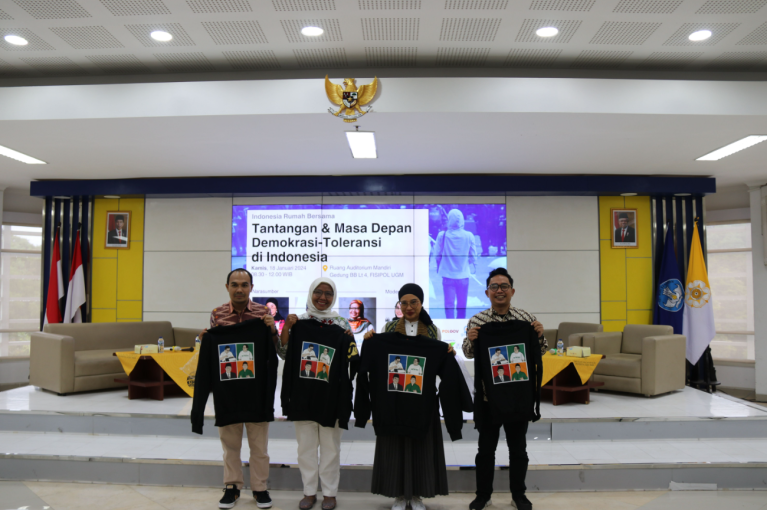
Yogyakarta, January 18th 2024─Ahead of the general elections to be held in February 2024, it is important for the public to review the democratic climate in Indonesia. Namely, related to the question of democratic principles that have been truly implemented in Indonesia or just ‘democracy as if’, as Abdurrahman Wahid, often called Gus Dur, used to describe the New Order era. Departing from this, the Research Center for Politics and Government (PolGov) of the Faculty of Social and Political Sciences of UGM together with the GUSDURian Network collaborated in organizing the Indonesia Rumah Bersama Seminar with the title “Challenges & Future of Democracy-Tolerance in Indonesia” at the Mandiri Auditorium of FISIPOL UGM on Thursday (18/1). The event also coincided with Gus Dur’s 14th Haul.
Amalinda Savirani, Head of PolGov UGM, assessed that democracy in Indonesia has decreased. “In fact, the condition of Indonesian democracy today is called regression by many experts. There are three characteristics. First, civil liberties continue to decline. Second, there is an increase in ideological polarization. Third, the use of the legal system as an instrument to reduce democracy and suppress critical groups,” said Amalinda. On the other hand, she also believes that there are opportunities to fight for democracy through a resilient civil society. Amalinda mentioned the GUSDURian Network as one example of such resilience.
In addition to a resilient civil society, we must not ignore the aspect of lack of literacy which can be a potential driver of weakening democracy. This was conveyed by Jay Akhmad, Coordinator of the GUSDURian Network Election Guard, when presenting the material. In addition, the lack of literacy is also accompanied by the rise of transactional politics, majoritarianism, and oligarchy and political dynasties. This condition is certainly a threat to democracy considering that civil society participation is an important element in democracy.
“Responding to this, the GUSDURian Network is making democratization efforts through the Election Guard movement which is an open space for anyone to conduct public education related to politics and democracy in the 2024 elections. The function of the GUSDURian Election Guard is for public education related to elections and democracy, building networks and advocacy with election organizers and supervisors as well as religious and community leaders, and monitoring the implementation of elections,” Jay explained.
The last speaker, Okky Madasari, a writer and academic, underlined the aspect of economic inequality and injustice in discussing the challenges of democracy in Indonesia. “Economic inequality is the gap between the poor and the rich. When this happens, we cannot talk about tolerance and democracy. We have to talk about the roots of the potential for violence,” said Okky. There have been many cases of violence stemming from intolerance between groups rooted in economic inequality. According to Okky, tolerance cannot be built without economic justice.
